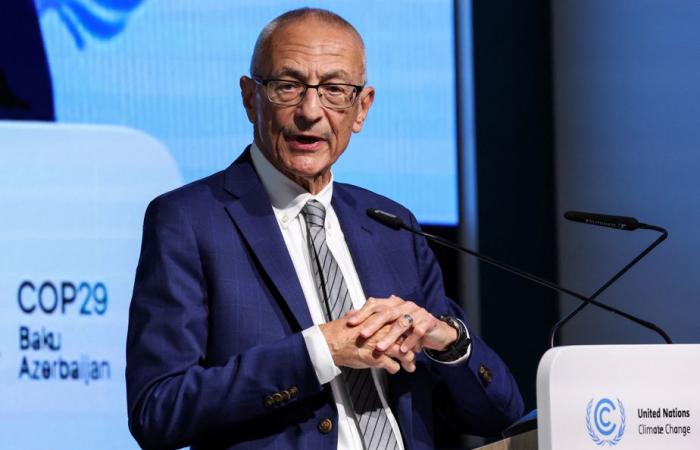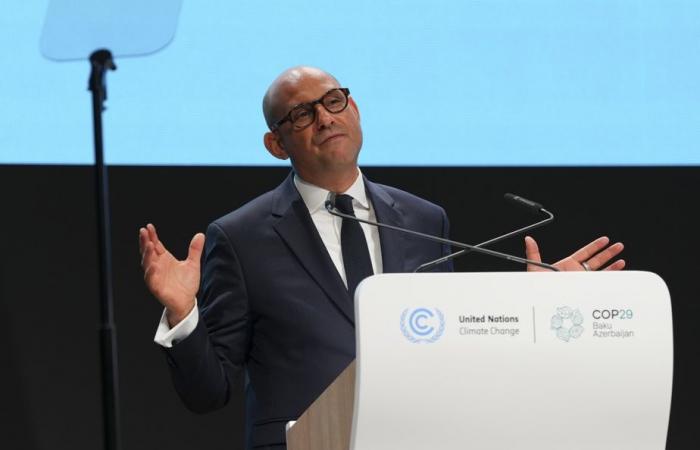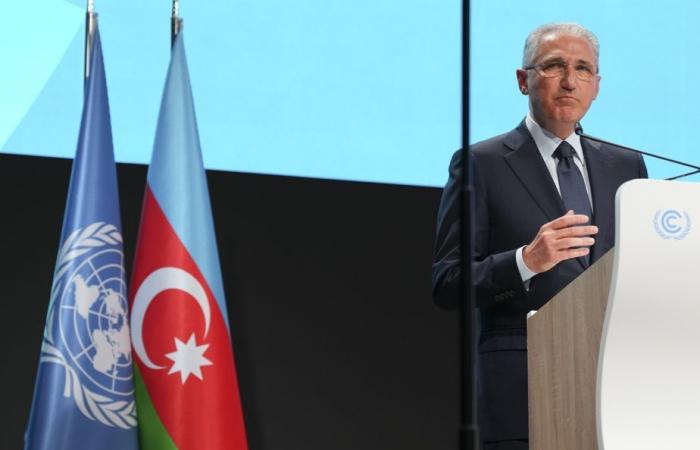(Baku) A few months before Donald Trump’s return to power, Joe Biden’s representative at the annual UN climate conference in Baku promised Monday that climate action would continue in the United States.
Posted at 6:24 a.m.
Updated at 9:49 a.m.
Benjamin LEGENDRE
Agence France-Presse
But the prospect of American withdrawal from the flagship Paris agreement (2015), for the second time, weakens the words of the negotiators of the world’s leading power.
The COPs have already experienced this under Donald Trump’s first term (2017-2021): at the time, federal states, cities and businesses had promised to compensate, at least in part, for setbacks at the federal level.
“Even if the US federal government under Donald Trump pauses climate action, the work to contain climate change will continue in the United States,” John Podesta, US climate envoy, said at a conference in press.
The theme of cooperation between States, while the world has still not succeeded in stabilizing its greenhouse gas emissions, runs through all the subjects of this conference organized by the UN and Azerbaijan.
“It is time to show that global cooperation is not at a standstill. It rises to the moment,” said the head of the UN Climate Change, Simon Stiell.
PHOTO PETER DEJONG, ASSOCIATED PRESS
Simon Stiell
The main issue of this COP, which will last until November 22, is to set the amount of climate aid from developed states for developing countries so that they develop without coal or oil, and can face more heatwaves and floods. Today at 116 billion dollars per year (in 2022), future climate aid must be increased more than tenfold, according to poor countries.
Developed countries have contracted a “climate debt”, launched Tasneem Essop, of the Climate Action Network (CAN), which brings together thousands of NGOs.
But Westerners consider the orders of magnitude put forward to be unrealistic for their public finances.
COP29 President Mukhtar Babaev spoke of “hundreds of billions” in his opening speech, but no negotiator revealed his cards.

PHOTO PETER DEJONG, ASSOCIATED PRESS
Moukhtar Babaïev
Blocked agenda
These promises of collective perseverance did not prevent an embarrassing failure of the negotiations from the start of the conference: the States opposed each other on the official agenda, which blocked everything.
Reason: several countries, including China and India, only want to discuss the application of the COP28 agreement from a financial perspective. While the COP in Dubai last year also set objectives to launch the exit from fossil fuels.
Another point of contention: China demands, also speaking on behalf of Brazil, India and South Africa, to add the subject of unilateral climate-related trade barriers, mainly targeting the European Union.
Paris Agreement in danger
“COP29 is a moment of truth for the Paris agreement,” said Mr. Babaev, Azerbaijani Minister of Ecology, and former executive of the national oil company, Socar, at the opening on Monday.
Around 51,000 participants are accredited, according to UN Climate. Many NGOs criticize the holding of the conference in a country which celebrates oil as a “gift from God”, and where the authorities have arrested and are prosecuting several environmental activists.
It will only take one signature for Donald Trump, when he enters the White House on January 20, to join Iran, Yemen and Libya outside the almost universal agreement adopted in Paris in 2015.
This agreement is the driving force that has made it possible to change the trajectory of warming to around 3°C or less by 2100, compared to 1.3°C already on average today, and probably 1.5°C over a individual year in 2024.
In Paris, countries committed to limiting warming to 1.5 or 2°C, compared to 1850-1900.
Absent people
The Europeans swear that they will redouble their efforts to compensate for the American withdrawal, but few are in Baku. And only a handful of G20 leaders will be present.
Public money from the North, today at 69% of loans according to the OECD, makes it possible to build solar power plants, improve irrigation, build dikes or help farmers face droughts.
But the mood in rich countries is one of austerity (in Europe) or international disengagement (in the United States).








